La version française de cet article est disponible après le texte anglais.
Call it an airborne mentality, a sense of confidence and purpose that comes from strapping on a parachute and jumping into the unknown. As a young member of Canadian Airborne Regiment, Chief Warrant Officer Christopher Robin fed off that perception of exceptionalism. It shaped him as a soldier and helped build resilience.
“We were really focused back then [with] a warfighting mentality in the regiment,” he recalled. “As an airborne commando, nothing stopped me.”
With modernization the top priority for the Army Commander as the Canadian Armed Forces adapts to a rapidly changing global security environment, resilience and purpose will be important qualities for the Army Sergeant Major (ASM). As the voice of the rank and file, the ASM often serves as a vital relay to the commander for how change is being accepted and incorporated.
Robin was appointed ASM in July 2024 and brings a breadth of operational experience from Somalia, Bosnia-Herzegovina, Haiti and Afghanistan, serving with all three battalions of the Royal 22e Régiment, the Canadian Manoeuvre Training Centre, 4th Canadian Division, Chief of Military Personnel, Canadian Special Operations Forces Command, and Vice-Chief of the Defence Staff.
But he credits the Airborne Regiment with providing the formative step in his career – parachuting – in which he ultimately became a subject matter expert and instructor at the highest levels in static line, freefall, canopy control, HALO (high altitude, low opening) and HAHO (high altitude, high opening) jumps.
While Robin did not initially consider the military as a career while in school, he has become a recognized leader at unit, formation, division and command levels. He spoke with Canadian Army Today about soldiers’ concerns as the Army scales up a multinational brigade in Latvia and embarks on its largest modernization effort, including a review of its structure, in recent history.
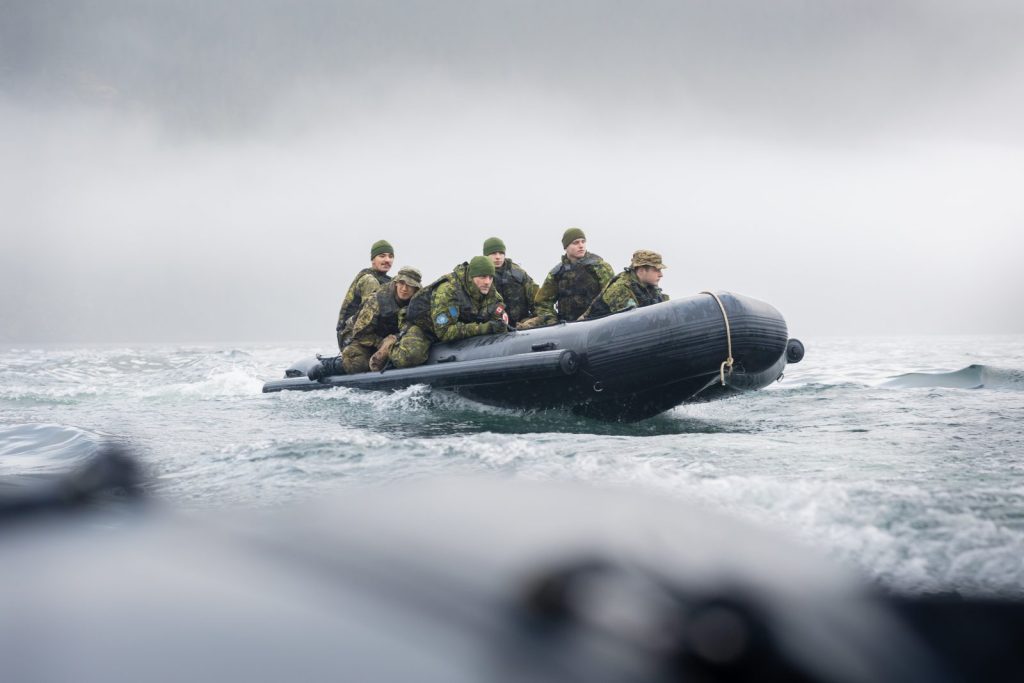
Members of 39 Combat Engineer Regiment training in December 2024. Photo: Bdr Sam Blake
What was it about parachuting that attracted you?
There’s a level of danger. [But] you build that confidence with the one who checks you, with the pilot flying the aircraft, with your job on the ground, which [happens] as soon as you hit the ground. You’re on hard timings right away. You have a mission, individually and collectively, but within an organized group. It takes dedication. You have a sense of purpose. For two years I was part of the reconnaissance or Pathfinder platoon in the airborne regiment. Everybody had a specific job … you felt that. If I had to be on that target or on that cutoff point or raising a panel marker for somebody to jump in, you’re a key player. It gave you a sense of belonging.
Was there a defining posting?
I think my most defining posting was Afghanistan, my first tour in 2007. As a platoon warrant, you are kind of the father figure to the platoon members and the spouse to the platoon commander, if you will. You’re a pretty big role model. Everybody’s looking to you when things go sideways. And things went sideways. That was the best time in my career, that and being the RSM of a battalion, and now the Army Sergeant Major. Platoon warrant is what shapes you. You don’t wish to go to war, but when you are there, you’re excited because you’ve trained for it: Let’s put everything together and hope it works. I think that [experience] defined me and kept me going forward. We lost people; we dealt with situations. And being able to deal with those situations, expected and unexpected, is kind of a checkmark in your career: Done that, and I know I can do it well.
How do you define your role?
It is all my experience from when I was a private to today. The commander has his advisors; he has generals advising him. But he needs my no BS opinion on certain things. What’s the pulse in the Army? That’s where he needs me the most. I’ve served in times where funding was not good, I’ve served in times when the military was not well perceived, I served in times when the military was at its highest in the eyes of Canadians. The CWO or the ASM can be intimidating, but people still feel connected to the Sergeant Major of the Army. They will open up to me. There’s a sense of trust, and I think that’s what [the commander] appreciates. It’s something he can build on.
What I like about [LGen Wright], I’ll give him my opinion and he won’t take it. He might say, thanks, but we’re not going that way.’ And that’s all right, because we can think differently. Even if I give him some advice that he doesn’t really want to capitalize on, and doesn’t always take, he knows that if the ASM is thinking that way, that means other people are probably thinking that way. It gives him a bit of perspective.
In that vein, you’ve visited troops across Canada and overseas since taking on this role: What are soldiers telling you?
We just returned from Latvia where the majority of our latest equipment is, where the newest technology is, where soldiers get to train with it and with allies. But what I hear is that they still don’t have all they need, that some equipment is broken. They don’t have the parts when they’re supposed to, they’re uncertain about ammunition. And if a soldier there, providing deterrence but ready for other actions, if necessary, still feels that they don’t have what they should have, that’s a concern.
We know that soldiers in Canada, at the moment, don’t have all they need when they train; we have pushed a lot of that equipment to Latvia. But in Latvia, a mechanic is saying, ‘I can’t fix a vehicle [because] we don’t have the parts, they’re coming from [a manufacturer] in Germany, but they have to first go to Canada and then take a boat back over here, because that’s how we do business.’ We are not effective when it comes to breaking a mold. We’ve been saying [we’re committing capability] to Latvia for a while now, that Latvia will have it all. Well, they still don’t … and now they’re questioning.
That’s where my role as a communicator becomes critical. If I sit with them and say, yes, it’s bad, it’s awful, they’ll lose total confidence. So, I need to stay positive. But those are key messages that the boss has to know about. … We have excellent soldiers, but we still don’t have enough vehicles, we still don’t have the parts to repair the vehicles, we still don’t have all the personal protection equipment that we should, we don’t have enough compasses for everybody wearing GPS, or enough ear protection and ballistic glasses that work. When we don’t have that, soldiers ask why. They rely on us, and we want them to know we share the same frustrations about the slow delivery of equipment. It’s important we keep providing regular updates so they know these deficiencies are being addressed on an ongoing basis.
Beyond equipment, what’s the top issue that you typically hear?
Cost of living. I think that’s the one that’s affecting people the most. Groceries, housing – will young people ever own a house today? Maybe, eventually. It used to be that when you were posted somewhere, there was a house for you, shopping facilities close by, schools and daycare, a hospital 24/7 on the base. Today, we don’t have that. Support is not how it used to be. We tore down a lot of houses because we weren’t using them.
Also, the insecurity [that comes with] a spouse losing their job when you move. We force people to move. We want people to move for good reasons – if I had only lived in one area or one sector, it would be hard to understand the rest of Canada and Canadians, so [different postings to different regions] has been important in helping me be able to give good advice and come up with good ideas. But the cost and uncertainty of moving from one province to another, and the language barriers or other restrictions that can come with that – sometimes it’s very difficult.
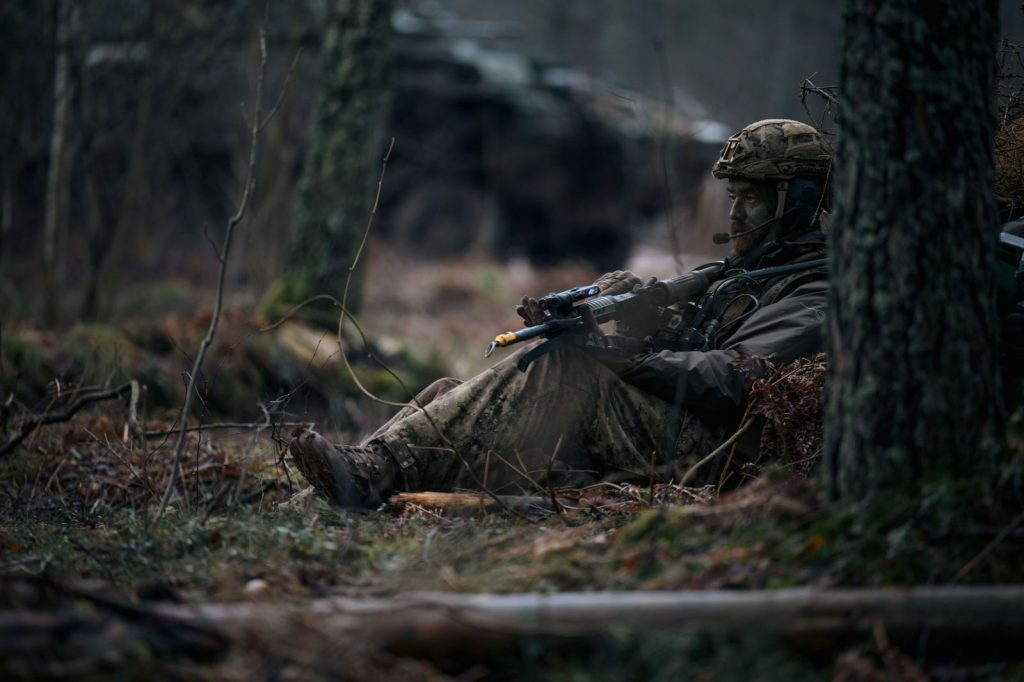
A member of Multinational Brigade-Latvia Battlegroup during Ex Shield Strike in January, 2025. Photo: NATO Multinational Brigade Latvia Imagery Copyright © 2025 DND-MDN Canada
To read social media and other media reports, morale is low. Is that your perception?
When people go on social media, often they vent, so some may conclude that morale is low. But having come from Latvia, having been in the UK seeing our troops train Ukrainians – they are loving it. They feel that they are part of something. They’re training people with everything they’ve got. They’re not holding anything back … and it’s humbling.
They might be unsatisfied because of [a lack of some] equipment, maybe because of certain living conditions (in Latvia some are in hotels, some in houses, and some living on base). But they don’t complain because they’re on a mission … they’ve got a job to do, and they’re enjoying it. They’re learning at the same time, building relationships with the allies, with the Ukrainians, which is critical today.
Given the current economic and political climate, are you getting questions about the U.S.-Canada military relationship?
Yes, they’re asking us directly: What is going on? Where do we stand? I’ll tell them, we are maintaining a relationship. I have an agreement with the Five Eyes community, all the Army Sergeant Majors, to speak every two months. We agreed [to that] before the recent U.S. elections. We agreed that whatever happens at the political level, it’s not our business. We stay aware of what is going on, but our business is to make sure that trust is maintained at the troop level, because we are partnered in pretty much everything that we do. We know that Canada is not going to lead something without the support of allies. So, it’s important to maintain those relationships.
Are Reserve members bringing forward unique issues?
Oh, very. The Army Reserve is still soul searching, if you will, and so are we, for the Reserve Force. There are two things: Reservists face issues with pay when they deploy. There’s a gap in our pay system. Somebody could go up to three, four months without getting the proper pay or pay adjustment when they deploy. This is not fair. If it’s a six-month deployment, it’s actually [longer] for a reservist because they have to leave their civilian job earlier [because of the readiness training].
Also, I would say part-time Class A reservists are doing way more work. A lot of them have supervisory roles, so if they’re working a day, it takes them another day to get things ready or prep a training session. There is some misunderstanding or maybe unfairness in how they are committed to work; they are not paid for the extra time that they’re putting in. We want part-time soldiers to work part-time. We don’t want them working full-time unless they are on a specific contract to do so. But sometimes we’re imposing things where they have to put in extra time … so we have to look at what we are asking of our reservists.
As part of the Army’s structure review, I gather you are assessing how you’re employing reservists, including the mission tasks that were assigned several years ago.
I think the restructuring as part of the modernization work is going to help us define how they should be employed. Should they be a domestic operations [force] only? Should they be an augmentation of 20 percent of the Regular force? Could one section out of three in an infantry battalion, let’s say, be reservists? Should they be deploying overseas? We learned that mission tasks are probably not appropriate, or at least not across the board for certain organizations. We came to realize that it’s very hard to force-generate them.
Geography is also an issue. In some parts of the country, it can take some reservists a full day just to reach a training area. If they only have a weekend to train, that means they’re travelling for two days. We want our reservists to be everywhere, but then we don’t have opportunities for them to train properly.
The one thing that we know for sure is that the Army Reserve is critical to the One Army team. We need them. We are too understrength not to have a Reserve component. That restructure is going to be important.
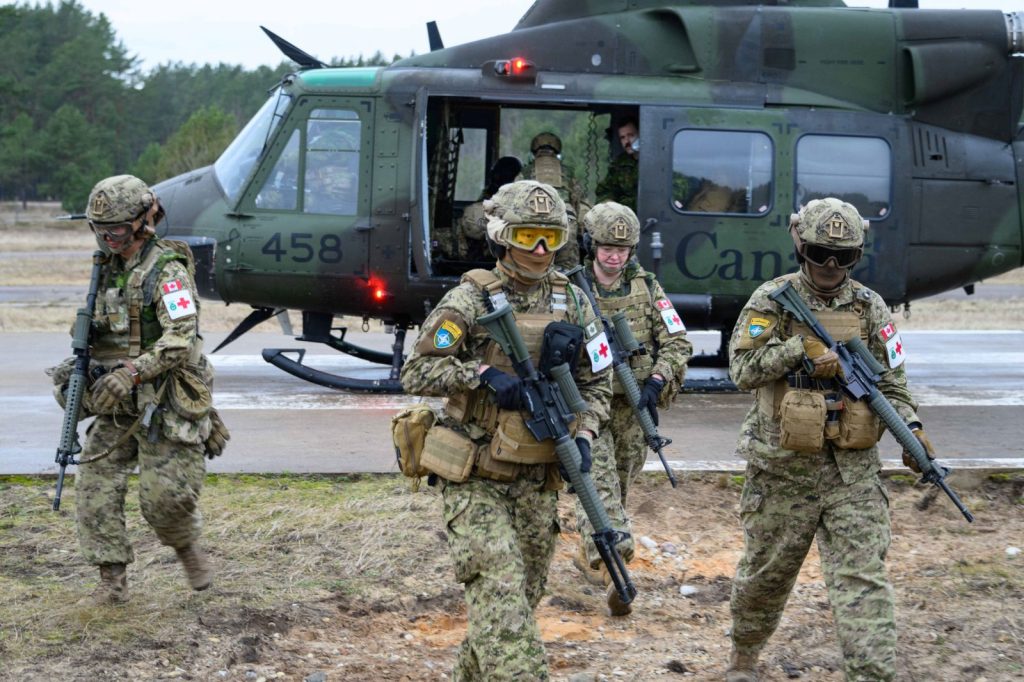
Members of NATO Multinational Medical Unit participate in a simulated casualty evacuation exercise in January 2025. Photo: MCpl Simon Arcand
What is your role with retention? Given the conversations you have, you probably have some sway.
I will help Chief of Military Personnel in establishing priorities so that we can help them collect some data. When I’m speaking to people, I remind them why they joined the Canadian Armed Forces and why they chose the Army in particular. I think people quickly forget. It can become, what’s in it for me. But that’s not why we joined initially. We joined because we want to serve Canadians. I remind people that we have a lot of soldiers on the frontlines, even if it is in support roles, on expeditionary and domestic operations. We’re there when things are not beautiful; that’s when we step up … My message when it comes to retention is mostly reminding them why they joined. It’s not always going to be roses.
Related to modernization, what from your perspective needs the most urgent attention?
Out of (LGen Wright’s) priorities, I think the biggest one is what we bring to the table. For the longest time, I think we’ve had a very good Army but maybe underequipped. The quality of soldiers has been there, and we’ve earned a good reputation among our allies for who we bring to the fight, but what we actually brought to the fight [was not]. With modernization, what we’ll bring will probably earn us a big pat on the back – highly skilled soldiers working with the latest technology. That’s also a motivator, bringing in the right equipment so that people have a purpose. Our tankers right now – it’s great to be armored if you’re out West, but if you’re out East, what are you doing? Getting the right equipment will give people purpose and it will give Canada a greater identity. Our allies will see, yes, Canada, it’s not just the quality of the soldiers they have, its also the capability they bring.
A final thought?
When I first got into this position, it was intimidating, but the commander had a vision, which was reassuring for me; it provided a way forward that we’re all collectively working towards. If his priorities weren’t defined as clearly as they are, my job would be a bit more uncertain. But I realized that I needed a set of priorities for myself that coincided with his. And I kept mine simple: Discipline, healthy choices, and respect.
If you look at modernization and the Army of the future, discipline will still exist. There are certain things that we don’t want to change. For me, discipline is the start of everything; it’s the backbone. If we’re an undisciplined Army, that’s when we make bad decisions, we don’t work well under stressful conditions, there’s misconduct, and there’s a lack of trust. Discipline goes a long way to enforcing that.
When I talk about healthy choices, it’s about a healthy soldier. It has to do with food, with mental health … When the body is unhealthy, it is a lot harder to fix. As I’ve aged, I don’t eat the same way I used to, I don’t train the same way, I’m not as strong, I’m not as fast, and I break easier. So, I’ve adjusted how I train, how I eat. A fit body makes a fit mind, and a fit mind is a healthy person. And a healthy person is what we need for longevity.
And respect: We have our ethical principles, we’re multicultural, and we need to respect the person [with whom] we’re working, in the same trench, in the same vehicle, in the same cubicle. It’s important because cohesion is what’s going to keep us tight. If not, we’ll crumble. Respecting each other means getting to know them … [and] being willing to step up and support them. I try to remind people that respect [means] creating work environments that are healthy. If all that comes together, then everybody performs, everybody’s healthy, everybody’s disciplined.
Forty-thousand people with their own identity, with their own objectives, is not going to work for the commander. Be as individual as you can, but you still must be able to work together for the same objective. That’s my biggest message: When the commander says the Army of today is not the Army that we’ll need tomorrow, my priorities will still exist in the future. And if people forget about them, which some do as they grow through the ranks, like serve Canada before self; if you forget that, you might show up late, you might not show up properly dressed, you might not care about certain things, you might find excuses. But if you remind yourself that you’re serving Canada before self, you’ll be there when the bell rings. As a profession of arms, we are different, we salute people, we have that respect for rank, and we should own that, we should be proud of that. And as long as it is respect from top to bottom and bottom to top, we’ve got something.
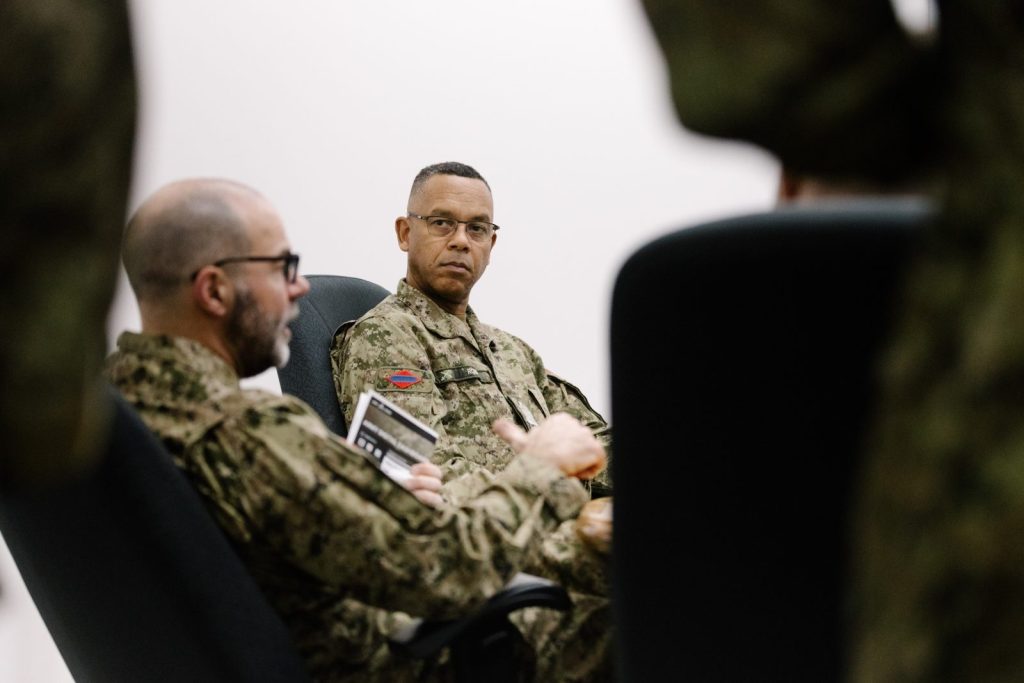
LGen Michael Wright and CWO Christopher Robin. Photo: Bdr Albert Law

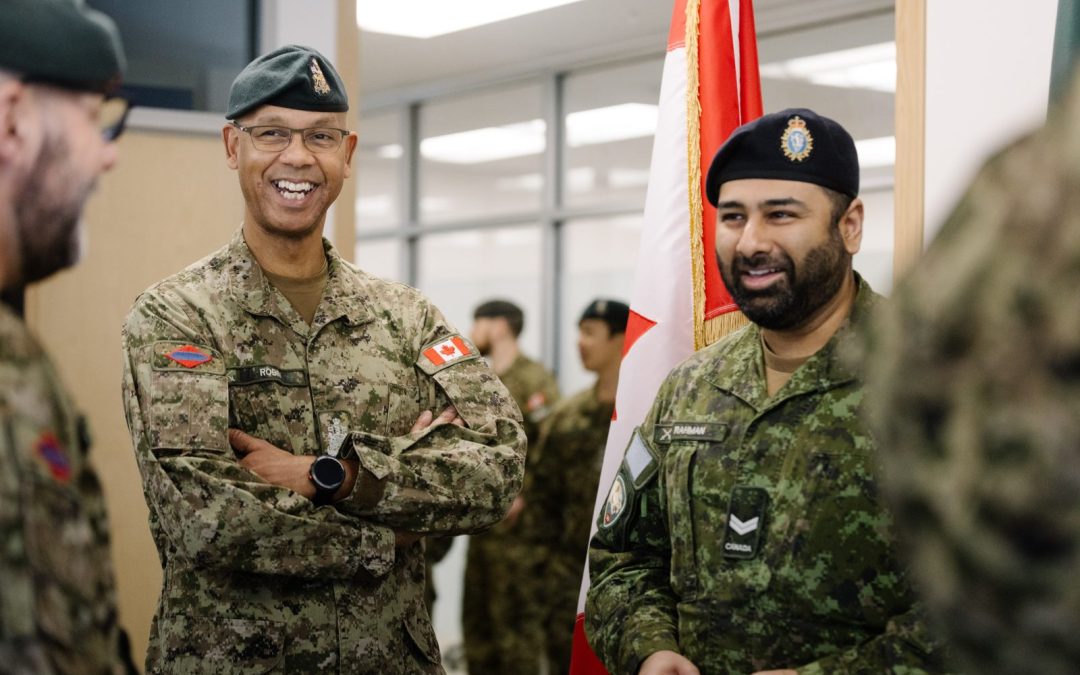
Respectfully, the current messaging around retention feels disconnected from the lived experience of most CAF members.
Telling people to “remember why they joined” may have good intentions, but it comes across as tone-deaf when so many are struggling with basic survival. This isn’t about people forgetting their purpose—it’s about the institution forgetting its responsibility to them.
The median income for CAF members sits between $55K and $70K. A box of KD is now $3. Tomato sauce is $6. Members are choosing between groceries and putting their kids in sports. CFHD has created a system where Privates can take home more than MCpls and Sgts. And promotions? They’re often off the table unless the member can afford a mortgage, or ski high rental prices – because military housing prioritizes new recruits over serving families. “Taking a posting” has become a financial risk, not an opportunity.
Many members still believe in “service before self” and the ‘hoorah’ mentality. But what’s being asked now isn’t sacrifice—it’s self-destruction.
Why would any member be expected to put the CAF ahead of their own family, when doing so might mean their spouse and children are living in cockroach-infested housing, relying on food banks, or being denied a stable, healthy upbringing? That’s not “the cost of service”—that’s a system failure.
Retention isn’t about motivational speeches. It’s about restoring dignity. If we want members to stay, we need to make staying viable—not just honorable.
Well said, I hope the ASM got this. Not just honourable; viable, I totally get it. Keep up the good work and don’t let the b*stards get you down.
It’s great to read this article now – in fact, on Canada Day. I’m hoping with our new government and commitment to significantly more funds, we can give our military personnel the support they need. This article highlights some key areas to explore. But one comment really rankles me, “My message when it comes to retention is mostly reminding them why they joined. It’s not always going to be roses.” Chief Officer Robin, this sounds like you’re pandering to whiners. I know our military are not whiners. And from the rest of the article, you are aware of many important things to do to address retention. At your level, I hope you can change your answer to this question to tell me, other Canadians, and our government, what really needs to be done to make Canadian Military an organization that the best and the brightest scramble to join and stay.